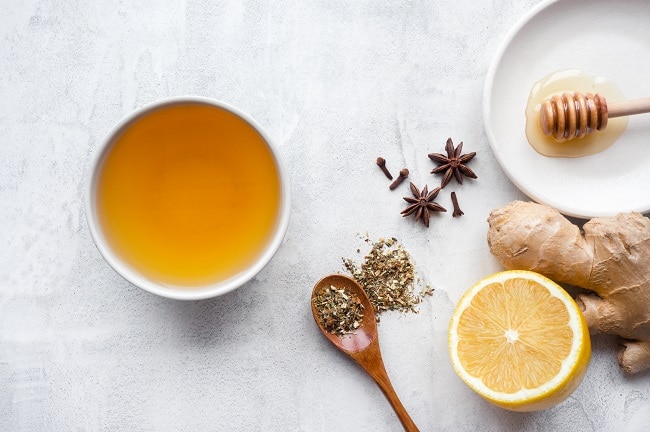Besides living a healthy lifestyle – including eating a well-rounded and wholesome diet, getting enough sleep and regularly managing stress – there are some foods and supplements that can provide extra support for immune health. Beyond the “big players,” such as vitamin C and zinc, consider herbal additions to your diet to help promote immunity. Here are seven types of herbs to try.
1. Curcumin
It’s impossible to go anywhere these days without hearing someone touting the benefits of turmeric. And no wonder: The incredible herb, which gives curry its characteristic yellow hue, has been praised for its neuroprotective abilities and antioxidant properties. Curcumin, the biologically active polyphenolic compound found in turmeric—if ever there’s a mouthful—might also help support immune health. Serve yourself some health for dinner tonight with this Turmeric Butternut Squash Mac & Cheese recipe.
2. Elderberry
From syrup to supplements, elderberry has become increasingly popular among the health-minded set. For good cause, too: The medicinal plant, also known as Sambucus, dates back to Hippocrates, who called the member of the Adoxaceae family his “medicine chest.” This arrives from elderberry’s inclusion of anthocyanins—a type of flavonoid with potent antioxidant activity.†
Make a mug of hot, healthful tea by adding two tablespoons of dried elderberries to 16 ounces of boiling water. Stir in a dash of cinnamon, a sprinkle of turmeric, a teaspoon of honey—and savor the taste of well-being.
3. Astragalus
A cornerstone of Traditional Chinese Medicine, astragalus has long been used as a restorative tonic; in other words, it’s an herb with the potential to organically foster wellness. Known as an adaptogen, astragalus may facilitate a stronger response to stress while also helping your body return to homeostasis.†
Incorporate it into your own version of wellness-promoting chicken noodle soup by sprinkling in 2 to 3 teaspoons of dried astragalus root.
4. Garlic
Simply put, what doesn’t taste better with garlic? Sweets aside, this pungent herb not only enhances everything from fish to veggies, it also operates as a boon for your immunity. As Dawn Jackson Blatner, RDN, puts it, “Garlic strengthens certain types of immune cells so we are better able to fight cold and flu invaders.”†
Already have that awful winter cold—or flu? The tangy herb may help with the severity of your symptoms.† Weave it into your winter salad by roasting whole cloves (drizzled with olive oil) for 30 minutes (or until cloves are brown and tender). Remove casing, slice, and serve on top of a bed of arugula. Add cherry tomatoes, goat cheese, red onions and Kalamata olives. You’ll practically taste the summer ahead.
5. Rosemary
This culinary mainstay isn’t just a superstar in the kitchen: Rosemary, a perennial plant that’s native to the Mediterranean, is also rich in iron and calcium, which are critical to optimal well-being. What’s more, rosemary contains folate—a water-soluble B vitamin that offers heaps of health benefits, including a calmer nervous system and the potential to ease those winter blues.†
For a unique and delicious take on the herb, blend a few snipped rosemary leaves into plain yogurt. Add sliced strawberries and a touch of honey. The probiotics from yogurt may support digestion, while the herb might just lift your overall mood.
6. Oregano
We may associate oregano with our favorite Italian dishes—pesto pasta, anyone?—but it ought to be just as closely linked to killing that cough that may have come with your winter cold: It possesses several health-promoting properties that may benefit lung or respiratory health.†
Bring this heady herb into your world by topping pan-fried Brussel sprouts with 1 to 2 teaspoons of dried oregano, 1 teaspoon of red pepper flakes and a quarter of a cup of freshly-grated parmesan cheese.
7. Ginger
In terms of botanical healing, ginger tends to be associated most often with soothing tummy problems, and yet it also serves as a great shield against symptoms of the common winter cold. Ginger root contains what’s known as gingerols—compounds in the rhizome that may naturally support relief from arthritis and the alleviation of a dry, scratchy throat.†
While ginger tea warms and comforts—particularly in the dead of winter—it needn’t be the only way you consume this flavorful root. Grate fresh, organic ginger over a medley of stir-fried vegetables (a savvy combination: asparagus, mushrooms, sugar snap peas and water chestnuts) and get a kick—not only to your palate but also to your health.
†These statements have not been approved by the Food and Drug Administration. These products are not intended to diagnose, treat, cure or prevent disease.

